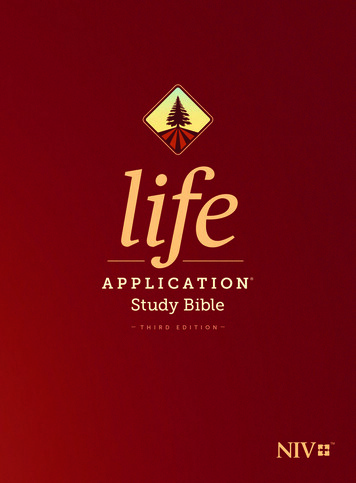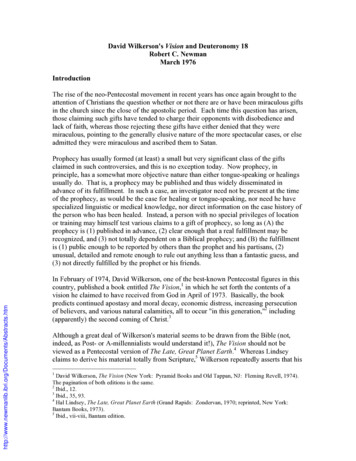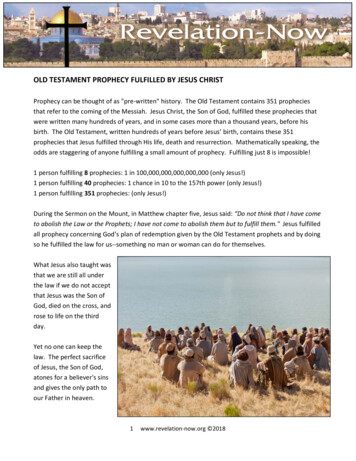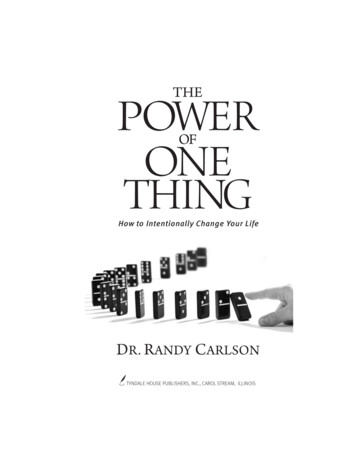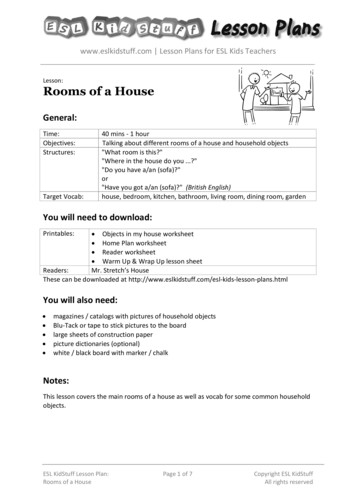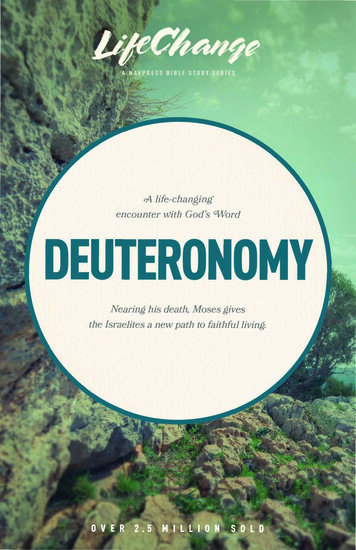
Transcription
A NAVPRESS BIBLE STUDY SERIESA life-changingencounter with God’s WordDEUTERONOMYNearing his death, Moses givesthe Israelites a new path to faithful living.A NavPress resource published in alliancewith Tyndale House Publishers, Inc.LifeChange TitlePages.indd 29 1Deuteronomy Repkg LC.indd2/12/2018 11:30:329:18:14 AMAM5/21/2018
NavPress is the publishing ministry of The Navigators, an internationalChristian organization and leader in personal spiritual development.NavPress is committed to helping people grow spiritually and enjoy livesof meaning and hope through personal and group resources that arebiblically rooted, culturally relevant, and highly practical.For more information, visit www.NavPress.com.DeuteronomyCopyright 1986, 2011 by The Navigators. All rights reserved.A NavPress resource published in alliance with Tyndale House Publishers, Inc.NAVPRESS and the NAVPRESS logo are registered trademarks of NavPress, TheNavigators, Colorado Springs, CO. TYNDALE is a registered trademark of TyndaleHouse Publishers, Inc. Absence of in connection with marks of NavPress or otherparties does not indicate an absence of registration of those marks.Cover photograph of wilderness copyright LevT/Adobe Stock. All rights reserved.Logo Flower City font copyright by wubstudio/Creative Market. All rights reserved.All Scripture quotations, unless otherwise indicated, are taken from the Holy Bible,New International Version, NIV. Copyright 1973, 1978, 1984 by Biblica, Inc. Used by permission. All rights reserved worldwide. Scripture quotations marked KJV aretaken from the Holy Bible, King James Version. Scripture quotations marked NASB aretaken from the New American Standard Bible, copyright 1960, 1962, 1963, 1968,1971, 1972, 1973, 1975, 1977, 1995 by The Lockman Foundation. Used by permission.Scripture quotations marked RSV are taken from the Revised Standard Version of theBible, copyright 1952 [2nd edition, 1971] by the Division of Christian Education ofthe National Council of the Churches of Christ in the United States of America. Usedby permission. All rights reserved.For information about special discounts for bulk purchases, please contact TyndaleHouse Publishers at csresponse@tyndale.com, or call 1-800-323-9400ISBN 978-1-61521-642-0Printed in the United States of America249238Deuteronomy Repkg LC.indd 22272162051941835/21/2018 11:30:34 AM
CONTENTSHow to Use This StudyDeuteronomy TimelineIntroduction—Why Deuteronomy?Chart of DeuteronomyMap: The Near East in 1400 BCOne—What Is Deuteronomy? (Overview)Two—The Land (1:1–3:29)Map: The Promised LandMap: Regions of CanaanThree—Reminders (1:9–3:29)Four—Reasons to Obey (4:1-43)Five—Love God (4:44–6:25)Six—Law and Faith (5:16-21; 6:20-25)Seven—Holiness (7:1-26)Eight—Pride (9:1–10:11)Nine—Doubting God (8:1-20; 10:12–11:32)Introduction to the Laws in 12:1–26:19Ten—Covenant Renewal (27:1–28:68)Eleven—Choose Life (29:1–30:20)Twelve—Moses’ Farewell (31:1–34:12)Thirteen—ReviewOptional Lessons on Justice (12:1–26:19)A. Pure Worship (12:1-32)Deuteronomy Repkg LC.indd 635/21/2018 11:30:34 AM
B. Prophecy and Magic (13:1-18; 14:1-2; 16:21-22;17:1-7; 18:9-22)C. Ceremonies of Holiness (14:1-21; 16:1-17)D. Tithes and Loans (14:22-29; 18:1-8; 23:19-20;24:6, 10-18; 26:1-15)E. More Economics (15:1-18; 23:24-25; 24:14-15, 19-22;25:13-16)F. Justice in the Courts (16:18-20; 17:2-20; 19:1-21;21:1-9, 22-23; 24:16; 25:1-3)G. War, Women, Kindness, Crime (20:1-20; 21:10-23;22:1-30; 23:1-8; 24:1-5, 7; 25:5-12, 17-19)Going On in DeuteronomyStudy AidsDeuteronomy Repkg LC.indd 41711791871952032092152165/21/2018 11:30:34 AM
Deuteronomy Repkg LC.indd 65/21/2018 11:30:34 AM
HOW TO USE THIS STUDYObjectivesMost guides in the LifeChange series of Bible studies cover one book of theBible. Although the LifeChange guides vary with the books they explore, theyshare some common goals:1. To provide you with a firm foundation of understanding and a thirst toreturn to the book2. To teach you by example how to study a book of the Bible withoutstructured guides3. To give you all the historical background, word definitions, and explanatory notes you need so that your only other reference is the Bible4. To help you grasp the message of the book as a whole5. To teach you how to let God’s Word transform you into Christ’s imageEach lesson in this study is designed to take sixty to ninety minutes tocomplete on your own. The guide is based on the assumption that you arecompleting one lesson per week, but if time is limited, you can do half a lesson per week or whatever amount allows you to be thorough.FlexibilityLifeChange guides are flexible, allowing you to adjust the quantity and depthof your study to meet your individual needs. The guide offers many optionalquestions in addition to the regular numbered questions. The optional questions, which appear in the margins of the study pages, include the following:Optional Application. Nearly all application questions are optional; wehope you will do as many as you can without overcommitting yourself.For Thought and Discussion. Beginning Bible students should be able tohandle these, but even advanced students need to think about them. Thesequestions frequently deal with ethical issues and other biblical principles.They often offer cross-references to spark thought, but the references do not7Deuteronomy Repkg LC.indd 75/21/2018 11:30:35 AM
Introductiongive obvious answers. They are good for group discussions.For Further Study. These include: (a) cross-references that shed light ona topic the book discusses, and (b) questions that delve deeper into the passage. You can omit them to shorten a lesson without missing a major point ofthe passage.If you are meeting in a group, decide together which optional questions toprepare for each lesson and how much of the lesson you will cover at the nextmeeting. Normally, the group leader should make this decision, but you mightlet each member choose his or her own application questions.As you grow in your walk with God, you will find the LifeChange guidegrowing with you—a helpful reference on a topic, a continuing challenge forapplication, a source of questions for many levels of growth.Overview and detailsThe study begins with an overview of the book of Deuteronomy. The key tointerpretation is context—what is the whole passage or book about?—and thekey to context is purpose—what is the author’s aim for the whole work? Inlesson 1, you will lay the foundation for your study of Deuteronomy by askingyourself, Why did the author (and God) write the book? What did they wantto accomplish? What is the book about?Then, in lesson 2, you will begin analyzing successive passages ofDeuteronomy in detail.In lesson 13, you will review Deuteronomy, returning to the big pictureto see whether your view of it has changed after closer study. Review will alsostrengthen your grasp of major issues and give you an idea of how you havegrown from your study.Each LifeChange guide is a little different, to suit the individual book.Deuteronomy is a long Old Testament book with fifteen chapters of laws forIsrael (12:1–26:19). You may be excited to study what these laws can showyou about God’s character, Jesus’ work, and our lives (see page 123 for anintroduction to the laws). Or you may have only thirteen weeks to studyDeuteronomy, so we’ve put seven optional lessons on the laws, organized bytopic, in the back of this study guide. You might want to try one or two ofthem or come back to them later.Kinds of questionsBible study on your own—without a structured guide—follows a progression.First you observe: What does the passage say? Then you interpret: What doesthe passage mean? Lastly you apply: How does this truth affect my life?Some of the “how” and “why” questions will take some creative thinking,even prayer, to answer. Some are opinion questions without clear-cut rightanswers; these will lend themselves to discussions and side studies.Don’t let your study become an exercise in knowledge alone. Treat thepassages as God’s Word, and stay in dialogue with Him as you study. Pray,8Deuteronomy Repkg LC.indd 85/21/2018 11:30:35 AM
DEUTERONOMY“Lord, what do You want me to see here?” “Father, why is this true?” “Lord,how does this apply to my life?”It is important that you write down your answers. The act of writingclarifies your thinking and helps you remember.Study aidsA list of reference materials, including a few notes of explanation to help youmake good use of them, begins on page 216. This guide is designed to includeenough background to let you interpret with just your Bible and the guide.Still, if you want more information on a subject or want to study a book onyour own, try the references listed.Scripture versionsUnless otherwise indicated, the Bible quotations in this guide are from theNew International Version of the Bible. Another version cited is the NewAmerican Standard Bible (nasb).Use any translation you like for study, preferably more than one. A paraphrase such as The Living Bible is not accurate enough for study, but it can behelpful for comparison or devotional reading.Memorizing and meditatingA psalmist wrote, “I have hidden your word in my heart that I might not sinagainst you” (Psalm 119:11). If you write down a verse or passage that challenges or encourages you and reflect on it often for a week or more, you willfind it beginning to affect your motives and actions. We forget quickly whatwe read once; we remember what we ponder.When you find a significant verse or passage, you might copy it onto acard to keep with you. Set aside five minutes during each day just to thinkabout what the passage might mean in your life. Recite it over to yourself,exploring its meaning. Then return to your passage as often as you canduring your day for a brief review. You will soon find it coming to mindspontaneously.For group studyA group of four to ten people allows the richest discussions, but you can adaptthis guide for other-sized groups. It will suit a wide range of group types,such as home Bible studies, growth groups, youth groups, and businessmen’sstudies. Both new and mature Christians will benefit from the guide. You canomit any questions you find too easy and leave for later years any questionsyou find too hard.9Deuteronomy Repkg LC.indd 95/21/2018 11:30:35 AM
IntroductionThe guide is intended to lead a group through one lesson per week.However, feel free to split lessons if you want to discuss them more thoroughly. Or omit some questions in a lesson if preparation or discussion timeis limited. You can always return to this guide for personal study later. Youwill be able to discuss only a few questions at length, so choose some fordiscussion and others for background. Make time at each discussion for members to ask about anything they didn’t understand.Each lesson in the guide ends with a section called “For the group.” Thissection gives advice on how to focus a discussion, how you might apply thelesson in your group, how you might shorten a lesson, and so on. The groupleader should read each “For the group” at least a week ahead so that he or shecan tell the group how to prepare for the next lesson.Each member should prepare for a meeting by writing answers for all ofthe background and discussion questions to be covered. If the group decidesnot to take an hour per week for private preparation, then expect to take atleast two meetings per lesson to work through the questions. Application willbe very difficult, however, without private thought and prayer.Two reasons for studying in a group are accountability and support.When each member commits in front of the rest to seek growth in an areaof life, you can pray with one another, listen jointly for God’s guidance, helpone another to resist temptation, assure each other that the other’s growthmatters to you, use the group to practice spiritual principles, and so on.Pray about one another’s commitments and needs at most meetings. Spendthe first few minutes of each meeting sharing any results from applicationsprompted by previous lessons. Then discuss new applications toward the endof the meeting. Follow such sharing with prayer for these and other needs.If you write down each other’s applications and prayer requests, you aremore likely to remember to pray for them during the week, ask about them atthe next meeting, and notice answered prayers. You might want to get a notebook for prayer requests and discussion notes.Notes taken during discussion will help you remember, follow up onideas, stay on the subject, and clarify a total view of an issue. But don’t letnote-taking keep you from participating. Some groups choose one member ateach meeting to take notes. Then someone copies the notes and distributesthem at the next meeting. Rotating these tasks can help include people. Somegroups have someone take notes on a large pad of paper or erasable markerboard so that everyone can see what has been recorded.Pages 219–220 list some good sources of counsel for leading groupstudies.10Deuteronomy Repkg LC.indd 105/21/2018 11:30:35 AM
Deuteronomy Repkg LC.indd 11Law code ofHammurabi(Babylon)1800EGYPT2134–1786 Middle KingdomEgypt’s secound most powerfulperiod1570–1200 New KingdomEgypt’s greatest periodIsraelities are slaves in Egypt1000(Judges)David Assyrian law code1200 Moses’ speeches in Moab(Deuteronomy) Fall of Jericho underJoshua1400 Exodus (Sinai covenant)Hittite law codes1600ISRAEL Abraham Isaac Jacob/Israel Joseph Israel’s family settles in EgyptLaw code of Ur(Babylon)2200 BC2000OTHERNEAR EASTERNLAW CODES(see page 65)DEUTERONOMY TIMELINE 6DEUTERONOMY115/21/2018 11:30:36 AM
Deuteronomy Repkg LC.indd 125/21/2018 11:30:36 AM
INTRODUCTIONWhy Deuteronomy?“Choose life, so that you and your children may live and that you may lovethe Lord your God, listen to his voice, and hold fast to him. For the Lord isyour life.”Deuteronomy 30:19-20Deuteronomy is one of the four Old Testament books most quoted in the NewTestament, along with Genesis, Psalms, and Isaiah. Why is Deuteronomy sofoundational to the New Testament?MosesFirst of all, Deuteronomy gives us the last words of Moses to the people he ledfor forty years. This man—born a Hebrew slave, adopted by an Egyptian princess, and raised as a prince—lost all hope of making his life a success when atage forty he killed an Egyptian in anger. He fled to the desert and kept sheepfor forty years. Then God called Moses to lead His own sheep, the Israelites,out of bondage in Egypt. Moses obeyed, and for another forty years he guidedthis grumbling mob of fugitive slaves through the wilderness.That long desert wandering was made necessary by the people’s rebellionagainst God. But when we join the story in Deuteronomy, the whole originalgeneration who left Egypt has died, and it is time for Israel to enter the landGod promised to them. Because of his own disobedience, Moses himself isforbidden to lead Israel across the Jordan River into Canaan. Instead, Joshua,Moses’ lieutenant, will lead the attack on the sophisticated, pagan cities ofCanaan. So the people halt their march in Moab, just east of the river, to hearMoses’ final words to them (see the map on page 36). His last three impassioned speeches are the book of Deuteronomy. These are the parting wordsof Israel’s seasoned leader, the core of what he prayed Israel would remember,expressed with the emotion of one who knows what will happen if the peopleforget.13Deuteronomy Repkg LC.indd 135/21/2018 11:30:36 AM
IntroductionThe treatyDeuteronomy contains Moses’ three speeches, but it is structured like anancient Near Eastern treaty between an overlord and his vassal (a vassal isthe chief of a subject clan or tribe; he makes treaties on behalf of his people).Deuteronomy formally states the covenant (treaty, pact, testament) betweenthe Lord and Israel. In a way, Deuteronomy is the old covenant. If we wantto understand “the new covenant” (Luke 22:20) that Jesus inaugurated andthe New Testament describes, we must understand the old covenant thatDeuteronomy summarizes.God first declared His covenant with Israel at Mount Sinai, just after thepeople left Egypt (see Exodus 19:1–31:18). But after forty years in the desert,almost everyone who accepted the agreement at Sinai has died and a wholenew generation has grown up. This generation knows of the oppression inEgypt, the miraculous deliverance, and the promises at Sinai only by report.Therefore, on the plains of Moab, Moses asks these people to reaffirm forthemselves the covenant their parents made with the Lord.None of the other nations in the Near East had treaties with their gods, sowhy did the Lord make one with Israel? Perhaps because it was the best way toexpress the relationship He wanted to have with His people.The LawThe name Deuteronomy is Greek for “second law” (deutero nomos). TheGreek translation of the Old Testament mistakenly renders Deuteronomy17:18 as “this second law” instead of “a copy of this law.” Deuteronomy is a“second law” only in that it repeats the Law for a new generation that was notpresent at Sinai.In calling Deuteronomy “this [book of the] law” (30:10; 31:24,26), Mosesdoes not intend it to be a “handbook”1 for judges. Rather, “law” (Hebrew:torah) means “religious teaching given by a priest, a prophet or a wise man.”2Deuteronomy expounds the faith that underlies Israel’s desire to obey God.The book details God’s faithfulness to Israel in the past (chapters 1–11) and inthe future (chapters 12–34).3 The covenant’s basic assumption is that God’sfaithful care for Israel motivates Israel’s faithful obedience to God. Therefore,Deuteronomy puts “laws” (in the narrow sense of rules of conduct) in thecontext of covenant love and faithfulness.We can begin to see the relationship between laws and grace in the structure of the Near Eastern treaty that Deuteronomy follows:1. A historical prologue recounts the Sovereign’s unearned kindness(grace, mercy) toward the vassal. The prologue is meant to inspiregratitude (see Deuteronomy 1–3).2. T he basic requirements describe the relationship between Sovereignand vassal. (In Deuteronomy 4–11, we find words like “love” and“chose” frequently.)3. The specific rules of conduct expected of the vassal (see Deuteronomy12–26) are based on the Sovereign’s past graciousness and the presentrelationship.14Deuteronomy Repkg LC.indd 145/21/2018 11:30:36 AM
DEUTERONOMY4. A clause requires the recording and sometimes the renewal of thecovenant (see Deuteronomy 27,29).5. Blessings and curses are promised for obedience and disobedience (seeDeuteronomy 28).4Old and newAlthough Deuteronomy is the old covenant and we live under the new covenant, it still has much to say to us. As you look for ways to apply passages youare studying, consider the following facts:1. The idea of a covenant or treaty with someone is unfamiliar to manymodern people. Deuteronomy can show us what it means to have acovenant relationship with God.2. God’s character has not changed, so anything we observe about Himin Deuteronomy can help us know Him better. Deuteronomy showsus what God cares about, how He wants to treat people, how He wantspeople to treat people, and how He wants to be treated. The old covenant shows how high God’s standards of justice and love are.3. Man’s nature has not changed, so Deuteronomy can show us what weare like.4. The ritual laws of sacrifices and festivals are not renewed in the newcovenant because Jesus fulfilled them in His self-sacrifice. We worship differently. However, the ritual laws do teach us what God is like,explain why Jesus’ death was necessary, and show how it was effective.New Testament concepts like atonement, redemption, and holinesscome from the old covenant.5. The civil laws are not renewed in the new covenant, since they weredesigned for the civil state of Israel. However, they apply principles ofjustice that are still valid. They show us what God values, and theyteach us by analogy what it means to love God and our neighbor. Fewmodern people know how much our own legal principles and procedures owe to Deuteronomy.6. Some expectations of the old covenant are renewed in the new covenant. The ethical laws of Deuteronomy 6:5 and Leviticus 19:18, and theTen Commandments (see Deuteronomy 5:6-21), which support them,are explicitly repeated and expanded upon in the New Testament. Godstill wants us to live by them, although we are no longer condemned ifwe fail.5 (See the box “Law and Grace” on page 78.)1. J. A. Thompson, Deuteronomy: An Introduction and Commentary (London:InterVarsity, 1974), 13.2. Thompson, 12.3. J. Sidlow Baxter, Explore the Book (Grand Rapids, MI: Zondervan, 1966), 212.4. Thompson, 19.5. Gordon Fee and Douglas Stuart, How to Read the Bible for All Its Worth (GrandRapids, MI: Zondervan, 1982), 135–147. Christians understand the nature of the“new covenant” and the extent to which Old Testament laws should apply to usin widely different ways. You might ask your pastor how your church views theseissues.15Deuteronomy Repkg LC.indd 155/21/2018 11:30:36 AM
IntroductionCHART OF DEUTERONOMY1 Promise and unbeliefHistoricalPrologueFirst1:1–3:29Speech2 Conquest3 Land allotted; Moses’ plea4 Listen and live; God’s nature5 Ten Commandments: response to God’s nature6 The Lord is One . . . Love the LordBasicStipulations4:1–11:327 Holy People8 Grace remembered9 Disobedience remembered10 Covenant remembered11 Covenant summary12 The place of worship13 Idolatry14 Clean food; tithes15 ReleaseSecond 16 FeastsSpeech 17 LeadersSpecific18 Tithes; prophecyCases19 Legal procedures12:1–26:1920 Holy war21 Various laws22 Various laws23 Various laws24 Various laws25 Various laws26 FirstfruitsDocument Clause27 Covenant renewal ceremonyBlessings and CursesRecapitulation29:1–30:20Transfer ofLeadership31:1–34:1228 Blessings and cursesThird29 Recap: the things revealedSpeech 30 Return and choose life31 Transfer of authority32 Song of accusation33 Blessings34 Moses’ death16Deuteronomy Repkg LC.indd 165/21/2018 11:30:37 AM
DEUTERONOMYThe Near East in 1400 BCEuphrates RiverHamathNONCYPRUSSYRIALEBAMEDITERRANEAN SEADamascusCANAANGazaMOABKadesh BarneaNi leRive rTHE PROMISED LAND(Deuteronomy 1:7)SINAIpossible route of the ExodusEGYPTMt. Sinai(Horeb)0100200MilesRED SEA17Deuteronomy Repkg LC.indd 175/21/2018 11:30:38 AM
Deuteronomy Repkg LC.indd 185/21/2018 11:30:38 AM
Lesson OneOVERVIEWWhat Is Deuteronomy?Bible teachers agree that it is important to do anoverview of a book before studying it in detail.Because Deuteronomy is a long book, you mightplan two weeks for the overview. This will giveyou plenty of time to absorb the “How to Use ThisStudy” section on pages 7–10, the introduction onpages 13–17, and this first lesson. Many people findDeuteronomy intimidating at first glance, but itsoon becomes manageable if taken gently at first.If you are studying with a group, see the “For thegroup” section on pages 25–27.First impressionsIf you have read the introduction on pages 13–17,you have some idea of what is in Deuteronomy. Still,there is no substitute for reading the book quicklyyourself. If you spend ninety minutes doing this,you will have a much better sense of how particularpassages fit into the whole work.Use the chart on page 16 as a guide to thebook’s structure. The chart shows various ways ofdividing Deuteronomy:1. The far left column divides the book into thesections of a treaty to emphasize that this is theSovereign Lord’s covenant with Israel.2. The center column shows where Moses beginsand ends his three speeches. Notice that the firstspeech contains part of the basic requirementsas well as the prologue.19Deuteronomy Repkg LC.indd 195/21/2018 11:30:38 AM
Lesson One3. The far right column suggests titles for eachchapter of the book. Later in this study, you willmake up your own titles.For this overview, don’t feel you must read everyword of the book. In the upcoming questions, someimportant passages are suggested, but you need notlimit yourself to these. The more effort you give tooverview, the better prepared you will be for detailedstudy. Prayerfully consider the amount of the timeyou can devote to this.The study guide allows space to answer questions, but if you want more room for furtherthoughts, optional questions, discussion notes,prayer requests, and plans for application, you canget a small notebook.Most of the places named in Deuteronomy areon one of the maps on pages 17, 31, and 36.1. Deuteronomy 1:1–3:29 is like the historicalprologue in a treaty (see #1 on page 14); init, Moses describes the Sovereign’s unearnedkindness toward His subjects.a. Read at least 1:1,19-46; 2:14-15,24-25,31-37.Of what events does Moses remind Israel?b. W hat can we learn about the Lord from theseevents?20Deuteronomy Repkg LC.indd 205/21/2018 11:30:38 AM
Overview2. In chapters 4–11, Moses states the basic thingsthe Lord expects of Israel under the covenant.a. Read two or three of these passages: 4:1-8,3235; 5:1-21; 6:4-9,20-25; 7:7-11; 9:4-6. Whatare some of the Lord’s basic expectations?Notice the words that describe the covenantrelationship between God and Israel (love,choose . . .) and those that describe God’sexpectations (love, serve . . .).b. W hat impressions of the Lord does thissection give you?3. The basic requirements of 4:1–11:32 areelaborated into specific laws in 12:1–26:19. Reada few of the laws, such as 15:12-18; 16:9-12,1822; 19:15. (The chart on page 16, the subtitlesin your Bible, and the optional lessons on pages163–214 may help you find topics that interestyou.)a. W hat kinds of matters do the laws cover?21Deuteronomy Repkg LC.indd 215/21/2018 11:30:38 AM
Lesson OneFor Further Study:What do thefollowing versessay about God’snature: Deuteronomy4:24,31,37; 5:8-10; 7:79; 10:15-16; and 23:5?b. W hat do you observe about God (His justice,priorities, values, and so on)?4. Chapters 27–34 include a ceremony forrenewing the covenant with each generation, afinal exhortation to obey, and some things thathappened when Moses transferred leadership toJoshua.Read at least 30:19-20; 31:24-32:7; 33:1-4.Notice on page 16 how these chapters fit intothe treaty. What do you observe about God’scharacter and the old covenant?22Deuteronomy Repkg LC.indd 225/21/2018 11:30:39 AM
Overview5. From the introduction and your first reading,what would you say Deuteronomy is about?Summarize it in a sentence, or give the bookyour own title.Study Skill—ApplicationSecond Timothy 3:16-17 tells us that all Scripture“is useful for teaching, rebuking, correctingand training in righteousness, so that the manof God may be thoroughly equipped for everygood work.” Romans 15:4 and 1 Corinthians10:6,11 explain that Old Testament laws andhistory were recorded to teach, encourage,and warn us and to give us examples to follow. Therefore, the last step of Bible study isalways to ask ourselves, What difference shouldthis passage make to my life? How should it makeme want to think or act? In your overview ofDeuteronomy, you may have encountered:1. An aspect of God’s unchanging character.You can meditate (see page 9) on the verse orverses that show this aspect. Mull them over inyour mind and ponder their significance. Howshould God’s character affect the way you pray,treat your family, act at work, use your time ormoney, and so on? Write your conclusions anddecisions in a notebook or the blank space atthe end of this lesson. Tell someone what youdecided.2. An ethical principle repeated in the NewTestament, such as 5:7-21. How can you applythis principle to your life this week?3. A moral lesson from Israel’s experience.How is it relevant to your life?23Deuteronomy Repkg LC.indd 235/21/2018 11:30:39 AM
Lesson One6. a. In your first reading of Deuteronomy, did youfind anything you would like to commit tomemory or apply? If so, what one truth wouldyou like to concentrate on this week?b. How can you apply this truth in your life? Tryto think of at least one specific way.7. As you skimmed Deuteronomy, you may havecome across statements you’d like clarified orquestions you’d like answered as you go deeperinto this study. While your thoughts are stillfresh, jot down your questions here to serve aspersonal objectives for your investigation of thisbook.24Deuteronomy Repkg LC.indd 245/21/2018 11:30:39 AM
OverviewFor the groupThis “For the group” section and the ones in laterlessons suggest ways of structuring your discussions. Feel free to select and adapt what suits yourgroup.Get acquainted. Because Deuteronomy is a longbook, group members might appreciate two weeksto do the overview. If so, you can take a whole meeting to cover the following:1. Ask the group to read “How to Use ThisStudy” on pages 7–10 at home, but go over anyimportant or difficult aspects as a group. Explainanything you think might be unfamiliar to thegroup. Let people ask questions about the studyguide.2. The beginning of a new study is a good timeto lay a foundation for honest sharing of ideas, toget comfortable with each other, and to encouragea sense of common purpose. One way to establishcommon ground is to talk about what each member hopes to get out of your group—out of yourstudy of Deuteronomy, and out of any prayer, singing, sharing, outreach, or anything else you mightdo together. Why are you studying the Bible, andDeuteronomy in particular? You can also discusswhat you hope to give in your group. If you havesomeone write down each member’s hopes andexpectations, then you can look back at these goalslater to see if they are being met.It is important that everyone knows what thegroup is going to do and what he or she is supposedto do. Also, you will be better able to discuss personal application if you begin to establish trust.Worship. Some groups like to begin their meetingswith prayer and/or singing. Some share requests forprayer at the b
Scripture versions Unless otherwise indicated, the Bible quotations in this guide are from the New International Version of the Bible. Another version cited is the New American Standard Bible (nasb). Use any translation you like for study, preferably more than one. A para-phrase such as The Living Bi
